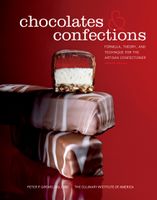Advertisement
About the Theory
By Peter Greweling and Culinary Institute of America
Published 2007
A long-standing tradition among craftspeople who have learned their trade through apprenticeship or trial and error is knowing exactly how to do a job, but not necessarily knowing exactly why it is done as it is. Many extremely skilled workers fall into this category. The theory presented in this book is an attempt to help confectioners understand more about how confections work so that when conditions or ingredients change, they can adapt, and when the results are not as expected, they can create new formulas or adjust existing ones. The confectionery theory provided in this book is written for nonscientists, and is presented in an approachable fashion. There is nothing about confectionery that cannot be easily understood by the average person with an interest in the subject. Virtually all of confectionery is governed by three basic concepts: (1) understanding and controlling the crystallization of sugars and fats, (2) manipulating water content, and (3) creating stable emulsions. Whether the confectioner is mass-producing thousands of pounds of candy bars in an automated facility or producing a few dozen truffles by hand, these are the vital concepts that apply.

